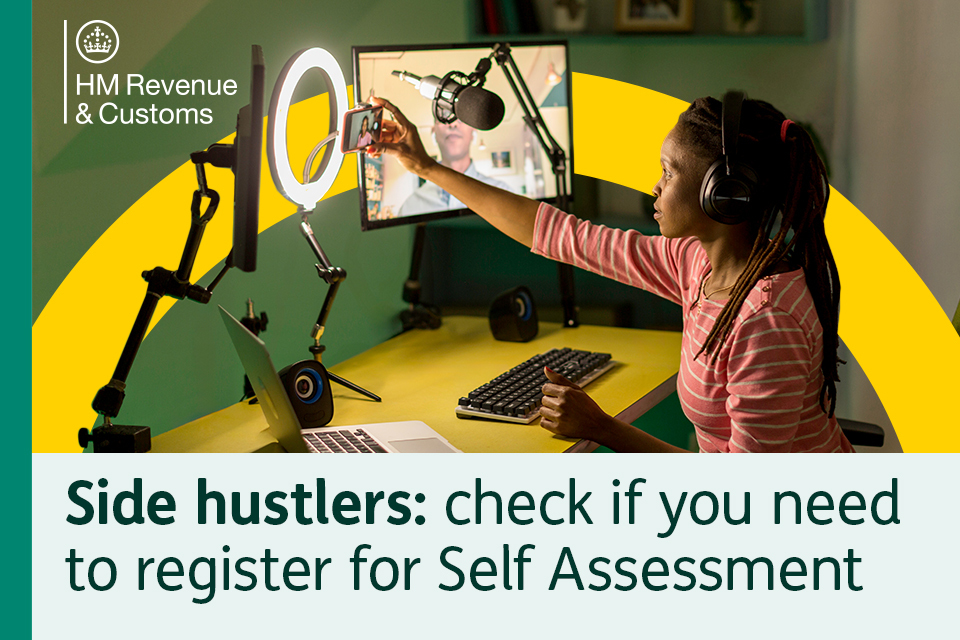- If you earn more than £1,000 from additional income, you may need to register for Self Assessment.
- Filing now means you will know your tax situation sooner and can spread payments over time.
- HMRC’s digital services make filing quick and easy.
Anyone earning extra income through a side hustle is being urged to check if they need to register for Self Assessment – and if so, file their tax return now.
HM Revenue and Customs (HMRC) is encouraging those with additional income streams – from online selling and content creation to dog walking and property rental – to understand their tax obligations and get ahead of the January deadline rush.
The £1,000 threshold is key anyone who earns more than this from their side hustle in a tax year may need to register for Self Assessment and complete a tax return. This includes gains or income received from cryptoassets.
Anyone who thinks they may need to complete a tax return for the 2024 to 2025 tax year can use the checker tool on GOV.UK to find out. New entrants to Self Assessment must register to receive their Unique Taxpayer Reference.
Easy-to-use guides for side hustlers can be found at the Tax Help for Hustles campaign page on GOV.UK.
Myrtle Lloyd, HMRC’s Director General for Customer Services, said
Whether you are selling handmade crafts online, creating digital content, or renting out property, understanding your tax obligations is essential. If you earn more than £1,000 from these activities, you may need to complete a Self Assessment tax return.
Filing early puts you in control – you will know exactly what you owe, can plan your payments, and avoid the stress of the January rush. You don’t need to pay immediately when you file – you have until 31 January to settle your tax bill.
The deadline to submit a Self Assessment tax return online and pay any tax owed for the 2024 to 2025 tax year is 31 January 2026.
Early preparation is particularly important for sole traders or landlords with a qualifying income over £50,000, as they will also need to get ready to start using Making Tax Digital (MTD) for Income Tax from April 2026. This will require digital record-keeping and quarterly updates using compatible software.
Visit GOV.UK to find out more about Self Assessment and how to file a tax return.
Further information
A full list of who needs to complete a tax return and a wide range of help and support is available on GOV.UK.
Those selling unwanted personal items (not trading) do not usually need to pay tax on this income.
HMRC is urging customers who meet the MTD for Income Tax £50,000 threshold to sign up to a testing programme on GOV.UK and start preparing now. Agents can also register their clients via GOV.UK.
Information on cryptoassets
- you need to make sure your tax return includes any gains or income received in relation to cryptoassets.
- Capital Gains Tax may be due if you sold or exchanged any cryptoassets. This includes selling cryptoassets for money, exchanging one type for another, using cryptoassets to make purchases, or gifting them away.
- Income Tax and National Insurance Contributions may also be due if you received cryptoassets from employment, or were involved in cryptoasset-related activities that generate income (for example, lending and staking).
- new for tax year 2024 to 2025 Dedicated sections are being introduced within the Self Assessment tax return for declaring cryptoassets separately from Capital Gains and Trusts and Estates.
- full guidance on cryptoasset taxation can be found on GOV.UK by searching for ‘tax when you sell cryptoassets’.
According to insight commissioned by HMRC and published in 2023, one in 10 people in the UK are operating in the hidden economy with 65% of these individuals most likely operating side hustles and largely unaware that they should be registered for tax.

